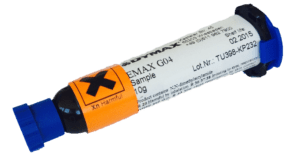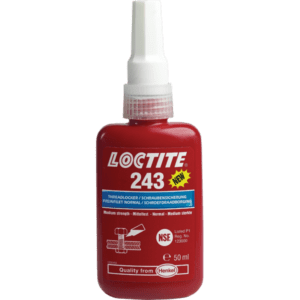As a global distributor of industrial sealants, Ellsworth Adhesives offers sealants from 3M, Dow Corning, Robnor ResinLab, Loctite, Dymax and Permabond, this blog post will provide you with advice on selecting the most effective sealant for your application.
What is a Sealant?
 Sealants, as their name suggests, are designed to seal assemblies and joints. By forming a barrier between itself and the substrate, a sealant should stop water, air, gas, chemicals and/or other media from penetrating through a surface or an object.
Sealants, as their name suggests, are designed to seal assemblies and joints. By forming a barrier between itself and the substrate, a sealant should stop water, air, gas, chemicals and/or other media from penetrating through a surface or an object.
Generally speaking, sealants contain inert filler material and are formulated with an elastomer to ensure they meet the minimum flexibility and elongation requirement.
Sealant Functions
To determine a sealant, there must be three basic functions, no matter its application demand:
1) It must fill a gap between two or more substrates
2) It then must form a barrier through the physical properties of the sealant itself and by adhesion to the substrate.
3) It must maintain sealing properties for the expected lifetime, this includes service conditions and environments.
Difference between Adhesives and Sealants
 The main difference between adhesives and sealants is strength – sealants are generally lower strength than adhesives, however sealants offer overall higher elongation. As such, sealants are mainly used as a finisher, sealing spaces that exist between one surface to the next, while adhesives are mainly used to bond services together.
The main difference between adhesives and sealants is strength – sealants are generally lower strength than adhesives, however sealants offer overall higher elongation. As such, sealants are mainly used as a finisher, sealing spaces that exist between one surface to the next, while adhesives are mainly used to bond services together.
Benefits of Sealants
Sealants offer the user simplicity and reliability, they can be used to bond virtually any desired combination of materials with each other, creating long-lasting bonds without the need for a number of components. This in turn creates a convenient process for the end user.
Sealants need to have sufficient adhesion to their substrates. Due to this they have a high resistance to environmental conditions, in turn ensuring bonding will hold throughout the required assembly’s duration.
In comparison to traditional joining techniques, sealants are becoming the more popular choice in today’s manufacturing industry and have been branded as the latest ‘bonding technology’, for various reasons.
Firstly, with regards to material choice, sealants can offer a specialist application with the ability to be used to bond virtually any desired combination of materials with one another, creating long-lasting bonds.
When compared to a traditional joining technique like welding or soldering process, sealants have the ability to carry out the same function with little heat input and no rivets or screws, guaranteeing a simple and quality process for the user.
Sealants are vital components of many products, they can determine the way materials are used together. Sealants are also incredibly versatile; they can bond materials together with exceptional power without adding to their weight. It is important to note sealants may be used for a permanent or temporary measure.
The excellent adhesion properties of sealants are a result of their chemical structure. They have the ability to bind together materials that traditionally would have been difficult to unite i.e. glass, metal and stone.
As aforementioned, sealants are a flexible substrate, they have the ability to move with the expansion and contraction of surfaces over a wide range of temperatures, including -20°C or lower whilst withstanding temperatures of 180°C and higher, as such offering resistance to temperature extremes.
Finally, sealants are incredibly durable, and are guaranteed to remain in a good condition over long periods of time. Not only does this increase safety but it results in excellent value for money for the consumer.
Types of Sealants
 There are several sealant types on the market to suit different applications including Thread, Flange, RTV (Room Temperature Vulcanising), UV light, Silicone and Polyurethane.
There are several sealant types on the market to suit different applications including Thread, Flange, RTV (Room Temperature Vulcanising), UV light, Silicone and Polyurethane.
Thread sealants are designed for low and high-pressure applications, providing an instant seal that prevents leakage of gasses and liquids and include Loctite 243, which is a general purpose threadlocker offering medium bond strength.
Flange sealants are highly elastic with an excellent adhesive strength to all important surfaces with the ability to seal metal and plastic flanges. Flange sealants like Henkel Loctite SI 5980 can replace traditional cork, wood rubber, paper and silicone gaskets.
RTV sealants are available as one-part or two-part adhesives, allowing the most suitable choice for the required application. Dow Corning one-part moisture cure silicones are generally cured at room temperature and in a range of 30 to 80 percent relative humidity, compared to two-part RTV silicones which cure rapidly at room temperature after mixing.
If UV light curing sealants are the most appropriate choice, the user has the option of Form in Place (FIP) sealants or gasket materials, this could be Dymax GA-140, FIP Gasketing Resin formulated for fuel cell, automotive door handle, appliance housing, and critical electronic assembly. An alternative is the E-MAX G04 gasket designed for sealing intricate, complex configurations as well as flat surfaces and wide or shallow grooves.
Silicones have long been known for durable dielectric insulation, as barriers against environmental contaminants and for their stress-relieving shock and vibration absorption. They can sustain their physical and electrical properties over a wide range of temperatures, humidity and other harsh environmental conditions.
Concluding Thoughts
With a broad range of sealants available, it is almost certain that there is a type to suit your application need.
By considering adhesives and sealants in your next design, you should be able to take advantage of many benefits including improved product durability and reliability, increased product performance and design flexibility as well as enhanced product aesthetics and improved process productivity. Coupled with a boost in overall product quality, sealants are certain to be an effective choice.
 Shop our extensive range of sealants here.
Shop our extensive range of sealants here.
To make an enquiry about any of our Sealants, contact Ellsworth Adhesives Europe via email: infoeurope@ellsworth.com or alternatively call 01355 321122.
If you are still unsure which sealant is best suited to your application, don’t hesitate to contact ‘The Glue Doctor’ who will be happy to analyse your application needs, end product and process requirements and recommend the most appropriate material.
